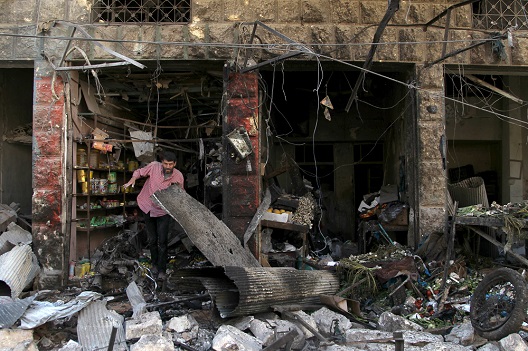 Assad regime air strikes on vegetable markets in the towns of Maarat al-Numan and Kafr Nubl in northwestern Syria fully resumed the all-out war against Syrian civilians. The supremely confident Bashar al-Assad, having been carried to a military comfort zone by foreign fighters in the air and on the ground, accomplished something of note in the context of his own personal performance: he actually plumbed new depths. For an Obama administration that has made operational indifference to mass murder in Syria a hallmark of its foreign policy, Assad’s sense of impunity and his defiance of UN Security Council resolutions presents a political-diplomatic challenge that transcends the humanitarian abomination the administration prefers to ignore. Clearly Assad intends to sink the Geneva peace process definitively.
Assad regime air strikes on vegetable markets in the towns of Maarat al-Numan and Kafr Nubl in northwestern Syria fully resumed the all-out war against Syrian civilians. The supremely confident Bashar al-Assad, having been carried to a military comfort zone by foreign fighters in the air and on the ground, accomplished something of note in the context of his own personal performance: he actually plumbed new depths. For an Obama administration that has made operational indifference to mass murder in Syria a hallmark of its foreign policy, Assad’s sense of impunity and his defiance of UN Security Council resolutions presents a political-diplomatic challenge that transcends the humanitarian abomination the administration prefers to ignore. Clearly Assad intends to sink the Geneva peace process definitively.
Administration officials tell Syrian opposition figures privately that they should lower their expectations of the Barrel-Bomber-in-Chief going anywhere anytime soon. The same officials say publicly Assad must go—the sooner the better—for the sake of creating anti-Islamic State (ISIS, ISIS, Daesh) Syrian national unity. The opposition senses it is being softened up for the kill in private even as senior administration officials strike magnificent poses, replete with florid, anti-Assad rhetoric, in public.
The Obama administration very much wants a healthy Geneva peace process, and Secretary of State John Kerry has put in plenty of time and shoe leather to make it happen. For a few weeks it seemed that the “cessation of hostilities” declared by Washington and Moscow in February might sustain the process. Violence went down, humanitarian aid deliveries went up, and Syrians in places like Maarat al-Numan and Kafr Nubl were able to concentrate their energies on getting the loathsome Nusra Front off their necks.
Russia, hoping to buy time for President Barack Obama to slide into an anti-ISIS partnership with Assad, seemed pleased by the oxygen being pumped into Geneva by the lower levels of violence. But Assad, with Russian and Iranian military efforts pocketed, saw the relative calm as a major threat. Peaceful demonstrations were being mounted by Syrians enjoying a respite from regime and Russian bombing. Local councils and civil society activists were coming up from underground. Ordinary Syrians were protesting the pre-Islamic strictures of one of Assad’s enemies of choice, the al-Qaeda-affiliated Nusra Front. Clearly the calm had to end.
Assad knows that which the Obama administration officials prefer to ignore: that the much-maligned Syrian opposition has politics not so remarkably different from politics around the world. Assad knows that if he resumes the liquidation and vaporization of the opposition’s civilian constituency, the opposition will be required to abandon Geneva—at least temporarily. And Assad knows that the whole Geneva exercise has but one point: the creation, on the basis of mutual consent, of a transitional governing body exercising full executive power.
These horrific attacks in northwestern Syria have one clear objective: to kill the Geneva process. Bashar al-Assad is confident enough in his own impunity to defy anyone. ‘Moscow wants a sustained talk-fest in Geneva? Too bad: I have what I need from Putin, and he still needs me more than I need him. The West is outraged? Don’t make me laugh.’
There is but one portal leading to political progress in Syria: civilian protection. The Assad regime is dead-set against yielding anything politically: this is why it has, for five years, put all of its chips on collective punishment and mass homicide. And it has a five-year scientific sample telling it that what passes for the West in the second decade of the twenty-first century will do nothing—literally nothing—to complicate its ability to murder on an industrial scale inside Syria.
“Plan B” has been overdue for years. The massacres in Maarat al-Numan and Kafr Nabl should be enough to bring it down from the shelf. If they are not, what in heaven’s name would do it?
Frederic C. Hof is a Resident Senior Fellow with the Atlantic Council’s Rafik Hariri Center for the Middle East.
Image: Photo: A man inspects damaged shops after an airstrike on a market in the town of Maarat al-Numan in the insurgent stronghold of Idlib province. REUTERS/Ammar Abdullah

